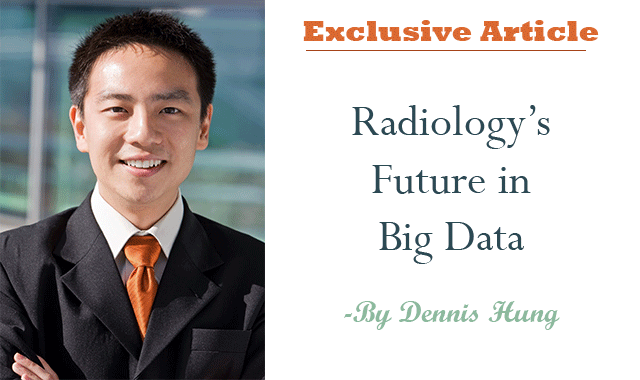Exclusive Article at EMRIndustry.com by Dennis Hung.
Dennis Hung is a business consultant and writer who’s passionate about health technology trends and medical technology topics. He’s spends most of his time consulting for healthcare companies in North America.
Big data is a big mystery. If you ask ten different people what they think big data means, you’ll get ten different answers. The most easily identified trait is that it deals with massive and complex data sets that make traditional data processing methods unworkable. So what does this mean for radiology, and the medical field in general? Nearly everyone in healthcare can agree on one thing: data drives marketing as well as diagnoses and outcomes. But having big data and actually using it are two different states of being that not every organization has successfully bridged. How the analysis is done and who does it can determine the future of a company, both financially and in the results of a patient’s care.
In most commercial settings, big data is leveraged to identify customer needs. But often the marketing side of a company remains isolated from the rest of the enterprise and may be working without a full picture of the available data. The advantages of big data in customizing the patient experience and eliminating the one-size-fits-all mentality are often lost to gaps in communication. Consumer patience is wearing thin with the traditional approach, which only offers minimally tailored solutions to their problems. This is equally true in the medical field. The necessary information is being made available by big data, but getting it to the right people at the right time remains a significant challenge.
Big data is in a strange place in the medical industry. It remains largely unproven, but that hasn’t stopped stakeholders from embracing big data. There is a strong promise in the air: big data can help us provide healthcare at a higher quality and reduced expenditures. But the actual state of things in the field is somewhat less positively developed. Big data uses heaps of data taken from diverse sources, and distills them into patterns that have problem solving potential. There are many sources, such as clinical, financial, and operational data. Some of the process can even be designed to allow for more involved input from the patient by using a preventative approach. There’s even a synthesis of structured and unstructured data, normalized from across the continuum of care to include medications, lab results, demographics, physician notes, and more.
So where does radiology come into the picture?
The role of big data in radiology is mostly about decision support, and it plays an elevated role in determining the way radiologists use clinical decision support systems to aid them when they read from the PACS system. Recent surveys suggest that the overwhelming majority of radiologists use clinical decision support software computer-aided diagnosis (CAD). But the interesting thing is that there isn’t as much confidence in CAD as there could be. While 89% say they always use it, only 2% of the radiologists surveyed say they often change their interpretations based on CAD readings. So why is there such a lack in confidence? Radiologists require demanding degrees of confidence in their work, and some say that the data simply isn’t there yet to instill the necessary levels of confidence for radiologists to trust.
So what’s the fix? Instead of relying on individual studies and data sets, big data offers a more universal degree of comprehension to increase confidence. Each clinical course and data can be saved and made ready for informed decision support, utilizing all available data. This means that CAD can have access to patients’ medical records as well as their immediate and past radiology data. The advantage of leveraging this data for improving clinical decision support systems like CAD, or even for the creation of newer support systems, is massive. Consider the ability to study patients with comparable characteristics in order to predict the likelihood of malignancies and other diseases.
Making this kind of data useful requires some leg work. The data will need to be put in a format that makes data mining possible, which means more energy investment, but the long-term payoff is worthwhile. It will be possible to search through complicated patient data from diverse sources quickly and intelligently, which should improve radiology diagnoses and patient outcomes as a whole.





































